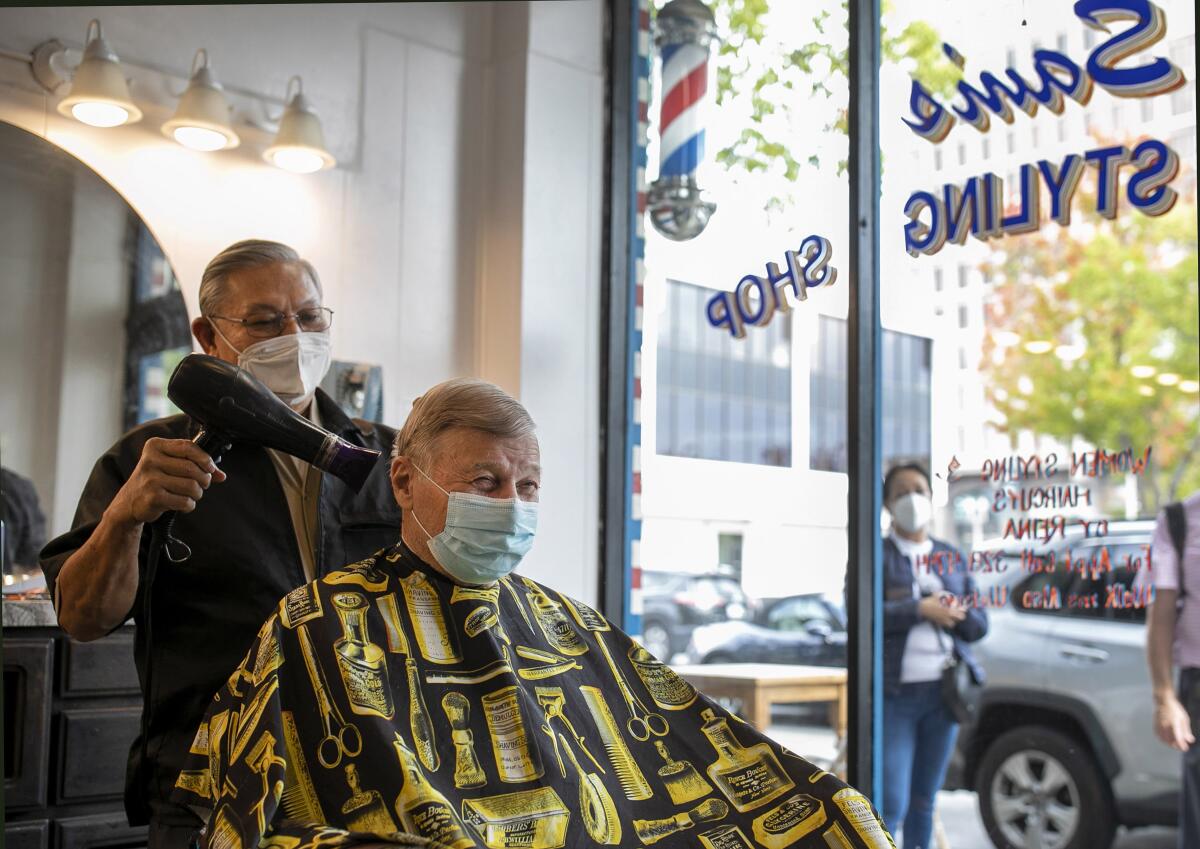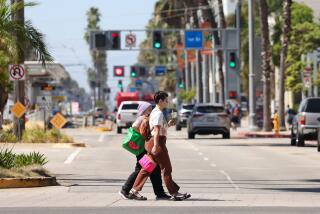Op-Ed: New COVID strains are coming. It’s no time to let down our guard

Winter is coming, and so are new COVID-19 variants. Based on the last two years, expect a botched national response when, not if, the winter surge comes.
Highly transmissible new COVID variants such as BQ.1.1 and XBB are capable of overcoming immunity from prior Omicron infections and are resistant to antibody-based treatments, rendering two of our best defenses far less effective.
New estimates by public health experts indicate that if we deploy a robust updated COVID-19 booster campaign that vaccinates 80% of those eligible by year’s end, we would “prevent approximately 90,000 deaths, more than 936,000 hospitalizations, and avert $56 billion in direct medical costs over the course of the next six months.” But that’s not happening. More than a month after rollout, only 4% of eligible Americans had received these updated boosters.
It’s not only the American people who are unprepared for the coming wave of infections. The medical system is on track to be more understaffed this winter than ever before. With an exodus of 500,000 nurses expected by the end of the year, the national shortfall of nurses would hit 1.1 million. Now is not the time to get sick.
And yet our national pandemic response continues its retreat. In California, Gov. Gavin Newsom announced on Monday that he will end the COVID state of emergency in February, after almost three years.
The federal government has shoved the responsibility of calculating individual risk onto each citizen and left public health to the masses. You see the result in schools, workplaces, restaurants, airplanes and grocery stores. The push for distancing, masking, better ventilation, screening, testing and basic safety measures has all but disappeared in most of these places.
The rush to get masks off in places frequented by the highest-risk individuals, like nursing homes and hospitals, is particularly appalling. So is the trend in recent months of doctors themselves gathering indoors, with few masks. Colleagues of mine have reported back from various superspreader medical conferences across the nation.
Even many who know better aren’t taking the simplest steps to end this pandemic and save lives. The president himself is touting the false narrative that “the pandemic is over.”
It isn’t.
About 2,600 Americans have died of COVID in the last seven days. Some use the 9/11 unit of measure to reflect the scale of the tragedy. I prefer to think about all the kids I went to high school with, our teachers and the staff, and then imagine all those people disappeared out of those buildings, the quad, those hallways. This is the national weekly reaping that is our COVID response. The weekly empty high school, the weekly — insert your preferred unit of horror. The pandemic is not over.
People over 75 make up more than 70% of deaths. In California, Black residents have the highest rate of dying, independent of their age. They are among those who have clearly been deemed disposable demographics by our government.
The only people for whom COVID is truly over are the thousands who die each week because of it.
As a doctor to vulnerable patients, as an immunocompromised person myself, as a daughter of cancer patients, I cannot accept this as a new normal. I know I am not the only one who has loved ones on chemotherapy, people I care about with organ transplants, with Crohn’s, with multiple sclerosis, with beloved elders and newborn babies they wish to protect.
If the federal, state and local governments are just going to gaslight the most vulnerable among us to an early death, we all have to undertake what amounts to an act of rebellion — pushing back against the “COVID is over” narrative.
Refusing to be gaslit doesn’t mean ignoring the reality that most people have already moved on. Pandemic fatigue is real. It’s also a luxury that the vulnerable cannot afford.
A few weeks ago, my parents received their second dose of the monoclonal antibody combination, Evusheld, used for high-risk patients as a prophylaxis against COVID. This week, I took them to get the new COVID booster. I might take them next week to their grandchild’s water polo game, where the sign next to the indoor pool requests that everyone wear masks. We will, again, most likely be the only masked spectators. Here, like seemingly everywhere else, we will have to rely on one-way masking because government and businesses have quietly dropped other tools that proved valuable earlier in the pandemic, such as screening, ventilation improvements and masking requirements.
These institutions have made a grotesque calculation to condemn a certain sector of the population to avoidable deaths.
A more humane and sane calculation is easy to envision: a huge push for vaccinations, free testing and therapeutics and preventive treatments, universal masking in settings with high-risk populations, better air filtration for shared spaces.
There has never been a great time to be medically vulnerable in the U.S., but when even such simple measures aren’t being taken, the value placed on these lives has unquestionably hit a new low.
We don’t have to roll over and accept it.
Dipti S. Barot is a primary care doctor at a clinic in the San Francisco Bay Area. @diptisbarot
More to Read
A cure for the common opinion
Get thought-provoking perspectives with our weekly newsletter.
You may occasionally receive promotional content from the Los Angeles Times.










